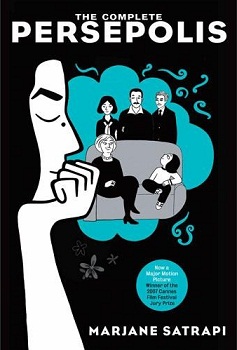Marjane Satrapi and Modernity

As Marjane Satrapi was unavailable for interview, I reviewed her past interviews in order to try and grasp her perspectives and stance on modernity. In doing so, I found a greater understanding of how Persepolis is a modern world literature.
Firstly, Satrapi puts great emphasis on individualism and stresses the need for an escape from dehumanisation. Capitalism, the economic system of modernity, causes alienation and dehumanisation. According to Marshal Berman, it leads to, “the breakdown of communities and the psychic isolation of the individual.” (124) Satrapi acknowledges this breakdown of community and dehumanising effect by saying that “Maybe the biggest problem is that there’s no empathy. Nobody puts themselves in the place of others. Everyone thinks they are the only one to suffer. Or that they’re the only ones who like ice cream or take their kids on vacation. People are always so shocked to find out that in Iran we knew about punk rock…. So I worked in anecdotes of my own to comment on the world. Because the world is not decided by George Bush and Saddam Hussein. They make things happen in the news, but that’s not real life. Real life is you and me.” As modernity causes people to be isolated, people are more alienated from fellow humans and the result is a lack of empathy and the dehumanisation of others. Satrapi tries to emphasise the personal experience of the characters and not just the historical facts. This effort to humanise the east is displayed by her stating that “by calling us an "Axis of Evil," we are completely dehumanised. The people who are dying every day are not just the "Axis of Evil" -- they're human beings who have children, who like ice cream, who want to make love, they have hopes and dreams and fathers and mothers and brothers and sisters.”. Satrapi moves away from the consuming nature of capitalism that prides only profit by declaring that “I’m one person and I believe that there is only one thing that is important and that’s the human being, the individual.”. By taking pride in individuality, Satrapi is resisting the reduction of humanity that capitalism causes in society, making Persepolis an important novel for reinforcing the subjectivity of people.
Satrapi is critical and realistic about modern capitalist society. Berman writes about capitalism and “its demands on people to exploit not only their fellow men but also themselves” (121). Satrapi acknowledges this by saying that "If the majority of people were right, we'd be living in paradise. But we are not living in paradise, we are living in hell. What does it mean? That means the majority of people are wrong. So I never believed what people told me." In modern society not only empathy is lost, but also trust, as manipulation is common in order to flourish. Berman also talks about the “relentless and insatiable pressure for growth and progress” (121). Satrapi reflects this thought by highlighting the aggressive nature of capitalism, “If you look closely at all these conflicts around the world, they come down to poverty and economics and resources. The more poverty, the worse the war.” Satrapi displays that she recognises the voracious and throwaway nature of capitalism, and “its pitiless destruction of everything and everyone it cannot use” (Berman 121).
 Modernity is fragmented and unstable. Everything in modern society is “made to be broken tomorrow…the whole process can go on again and again” (Berman 99). This instability can be seen through the unsettled nature of Iran, one minute there will be optimism, and the next it will be crushed. Satrapi recognises the ambivalent nature of modernity by communicating the optimism about the revolution but then the destruction that followed, “There was hope, lots of enthusiasm and excitement, and it almost gave the impression that the election would be free and fair. It felt like something good was going to happen, but unfortunately it didn't. There was vote-rigging and on top of that, people were killed and many were jailed.” Satrapi also talks about how change is still continuing in Iran, “The biggest change that has taken place in Iran since last year is that the notion of fear -- which [she] grew up with -- has completely disappeared. [The Islamic Republic has] ruled the country for 30 years because, although many people are not happy, they were afraid to protest. All of a sudden, [they] saw a significant number of people in the streets protesting, chanting slogans, demonstrating, chanting "Allahu Akbar" at night on their rooftops. They had the courage to do that despite the use of force by authorities.” Persepolis can be seen as a modern text as it reflects the constant change that modernism brings, and the unpredictable nature of such changes in society.
Modernity is fragmented and unstable. Everything in modern society is “made to be broken tomorrow…the whole process can go on again and again” (Berman 99). This instability can be seen through the unsettled nature of Iran, one minute there will be optimism, and the next it will be crushed. Satrapi recognises the ambivalent nature of modernity by communicating the optimism about the revolution but then the destruction that followed, “There was hope, lots of enthusiasm and excitement, and it almost gave the impression that the election would be free and fair. It felt like something good was going to happen, but unfortunately it didn't. There was vote-rigging and on top of that, people were killed and many were jailed.” Satrapi also talks about how change is still continuing in Iran, “The biggest change that has taken place in Iran since last year is that the notion of fear -- which [she] grew up with -- has completely disappeared. [The Islamic Republic has] ruled the country for 30 years because, although many people are not happy, they were afraid to protest. All of a sudden, [they] saw a significant number of people in the streets protesting, chanting slogans, demonstrating, chanting "Allahu Akbar" at night on their rooftops. They had the courage to do that despite the use of force by authorities.” Persepolis can be seen as a modern text as it reflects the constant change that modernism brings, and the unpredictable nature of such changes in society.
The style of the graphic novel is one not commonly seen on an English Literature course. However, the graphic novel fits in with modernity as it is part of the constant evolution and break from tradition that modernity brings. In addition to this, mass communication is a vital part of modern society, Berman states that “The scale of communications becomes worldwide” (91) in modernism. Therefore, the graphic novel is a good medium to use as pictures do not get distorted in translation and are universally recognised. Satrapi agrees with this view, by saying that “You see a picture and you understand perfectly, immediately, the basic thing that’s happening. It’s probably more accessible because we are in a culture of images now. People are used to seeing stories that way. They understand looking at pictures.” and also “In my case, it’s easier to draw it. And words also are filters. They have to be translated. Even in the original language, there is interpretation and some ambiguity. If there’s a cultural difference between the writer and the reader, that might come out in words. But with pictures, there’s more efficiency”. Therefore, Satrapi’s graphic novel style is a result of modernism, as a universal tool to facilitate mass communication.
Satrapi establishes Persepolis as a piece of modern world literature due to her awareness of the harsh modern world surrounding her. The themes of modern instability and fragmentation are recognised by her and found throughout Persepolis; and the humanisation of the East resists the capitalistic tendency to dehumanise.
Works Cited:
Berman, Marshall. All That is Solid Melts Into Air: The Experience of Modernity .Penguin: London. 1988. Print.
Interviews Used:
http://www.bookslut.com/features/2004_10_003261.php
http://www.believermag.com/issues/200608/?read=interview_satrapi
http://www.foreignpolicy.com/articles/2010/07/08/interview_marjane_satrapi?page=0,2
http://www.seanax.com/2008/01/27/the-exile-an-interview-with-marjane-satrapi/
